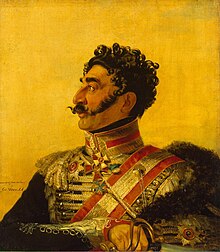Valerian Madatov
| Valerian Madatov | |
|---|---|

Portrait of General Valerian Madatov by George Dawe from the Military Gallery, 1820.
|
|
| Born | 1782 Avetaranots, Askeran Province, Karabakh khanate (nowadays Nagorno-Karabakh) |
| Died | September 4, 1829 (aged 46–47) Shumla, Bulgaria |
| Allegiance |
|
| Service/branch | Infantry |
| Years of service | 1806-1829 |
| Rank | Lieutenant General |
| Unit | Leib Guard |
| Battles/wars |
Russo-Turkish War, 1806-1812 Russo-Persian War, 1826-1828 |
| Awards | Order of St. George |
Prince Valerian Grigoryevich Madatov (Russian: Валериан Григорьевич Мадатов, Armenian: Ռոստոմ Մադաթյան, Rostom Madatyan) (1782 – September 4, 1829) was a Russian prince and a lieutenant-general of the Russian Empire.
Madatov was born Rostom Madatyan in 1782 in Avetaranots, a village of the historical Varanda county of the Karabakh Khanate (nowadays Nagorno-Karabakh), in a minor Armenian noble family as a melik (prince). At the age of 15 he left Karabakh for St. Petersburg with senior nobleman to seek support from Catherine the Great in their efforts to abolish Muslim control of the region.
In St. Petersburg, young Madatov joined the Leib Guard Preobrazhensky Regiment at the rank of praporshik, and for the next 10 years spent his time training and serving in lower officer ranks. Madatov saw action for the first time in 1808 on the Danube during the storming of the Brailov fortress, where he received his first order of commendation. In 1810 Madatov joined the Aleksandriya Hussar Regiment as a captain and later as a major. Madatov's first major combat experience was during the Russo-Turkish War, 1806-1812. For his actions against the Turks he was given on April 11, 1811 the Order of St. George of 4th degree. During Napoleon's invasion of Russia, he commanded a detachment, and successfully served in Kobryn and Barysaŭ, as well as during the capture of Vilnius. In 1812 Madatov received the rank of colonel. The next year he was injured in Leipzig. Still not fully recovered from his wound, Madatov was there to march his men across Paris. He would remain in France as one of the commanders of the occupational forces and as the Commander of the Hussar Brigade.
...
Wikipedia
